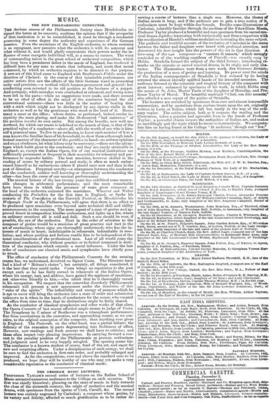THE GRESHAM MUSIC LECTURES.
PROFESSOR TAYLOR'S second series of lectures on the Italian School of Music attractednumerous audiences to the College on each occasion. The first was chiefly historical; glancing on the state of music in Italy towards the close of the sixteenth century, the origin of recitative and the musical drama, with specimens from the operas of Cesti, Cavalli, &c. The second lecture was entirely engrossed by Carissiroi; a composer whose genius, by its variety and felicity, afforded so much gratification as to be rather de- serving a course of lectures than a single one. However, the theme of Italian music is long; and if the audience are to gain a true notion of enthusiasm must be kept within due bounds. Besides some illustrations of Cariraimi, tolerably familiar through the medium of the Fitswilliam Mums' Professor Taylor produced a beautiful and rare specimen from his sacred mu- sical drama Jephtha ; interesting both intrinsically and from comparison with the recollection of Handel's sublime modulations in treating the same subject. The pathetic and truthful accents of the recitative of Carissimi in the scene between the father and daughter were heard with profound attention, and discovered his deer insight into the powers of the art in that direction. A love-song of the sae- composer—a "cantata di camera," which strongly reminded us of the warbling multilane of Purcell—was sweetly sung by Hobbs. Stradella formed the subject of the third lecture; introducing re- marks on the oratorio or sacred musical drama, in its origin and early cha- racter. The illustrations were from a rare work, San Giovanni Batista; the production of a man of genius and learning. Its power over the minds of the Italian contemporaries of Stradella is best evinced by its having arrested the almost literally uplifted hands of his intended RODfOlina The audience listened to the romantic and tragical history of the composer with great interest; enhanced by specimens of his work, in which Hobbs sang the music of St. John, Master Turle of the daughter of Herodias, and Pro- fessor Taylor of Herod. The beautiful madrigal " Clan, son fido amen*" also afforded a new aspect of the genius of Stradella.
The lectures are enriched by specimens from rare and almost inaccessible manuscripts, and by quotations from curious tracts upon the art, originally written in Latin or Italian, which fall but rarely in the way of the ordi- nary reader. The entire subject, both as it respects the reading and the illustration, takes a popular and agreeable form in the hands of Professor Taylor: a powerful charm invests the antiquities of Italian art, and makes us unwillingly quit the topic which he treats so instructively. We congratn- late him on having found at his College "fit audience," though not "few."


























 Previous page
Previous page